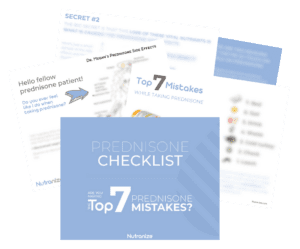How to Cope with Antibiotic Side Effects (A Pharmacist’s Perspective) + Is Prednisone an Antibiotic?

Understanding Antibiotic Side Effects: A Comprehensive Guide
Taking antibiotics unnecessarily can lead to the development of antibiotic resistance, where bacteria become resistant to the effects of antibiotics. We will delve into the crucial role antibiotics play in combating bacterial infections. You will shed light on the extensive use of antibiotics in various medical settings, such as hospitals and clinics, as well as in daily life.
This content will discuss the potential side effects associated with antibiotic use. These may range from mild issues such as gastrointestinal disturbances, allergic reactions, and skin rashes, to more serious concerns like antibiotic resistance, impaired immune function, and disruption of the body’s natural microbial balance.
Watch now!
Antibiotic & Side Effects I’ve Experienced
- Amoxicillin: Urine smell, loved the taste of the pink liquid as a kid
- Augmentin (amoxicillin-clavulanate): Diarrhea, stomach cramping
- Keflex (cephalexin): Not much
- Ceftin (cefuroxime axetil): Didn’t fully clear up my infection
- Omnicef (cefdinir)
- Clindamycin: Rash after cellulitis near foot surgery site
- Bactrim side effects: Easter morning as a baby I woke up with a rash of red dots that were itchy. My child had the same thing after a few doses.
- Dicloxacillin, Clindamycin
Common Antibiotic Side Effects
Gastrointestinal issues
Antibiotics can commonly cause gastrointestinal issues such as nausea, diarrhea, and stomach pain. These side effects occur due to the disruption of the natural balance of bacteria in the gut.
Allergic reactions
Some individuals may experience allergic reactions to antibiotics, resulting in skin rashes, itching, and swelling. These reactions can range from mild to severe and may require medical attention.
Yeast infections
Antibiotics can disrupt the balance of bacteria and yeast in the body, leading to an overgrowth of yeast and resulting in conditions like oral thrush or vaginal yeast infections.
Antibiotic-associated diarrhea
Certain antibiotics, such as those targeting C. difficile bacteria, can disrupt the normal gut flora, leading to antibiotic-associated diarrhea. This condition can be severe and may require specific treatment.
Photosensitivity
Some antibiotics can make the skin more sensitive to sunlight, leading to an increased risk of sunburn, rashes, or other skin reactions when exposed to the sun. It is important to protect the skin and use sunscreen while taking these antibiotics.
Less Common but Serious Side Effects
Antibiotic-induced liver damage
Some antibiotics can cause liver damage, especially when used in high doses or for prolonged periods. This can lead to liver dysfunction and may require medical intervention.
Kidney problems
Certain antibiotics can potentially cause kidney damage or worsen pre-existing kidney conditions. It is important to monitor kidney function while taking antibiotics and seek medical attention if experiencing symptoms such as decreased urine output or swelling.
Tendonitis and tendon rupture
In rare cases, certain antibiotics can increase the risk of tendonitis (inflammation of a tendon) or even tendon rupture. This is more common in individuals who are older or have a history of tendon problems.
Blood disorders
Some antibiotics can affect the production of red or white blood cells, leading to blood disorders such as anemia or low white blood cell count. These conditions can have serious consequences and require immediate medical attention.
It is crucial to emphasize the importance of seeking medical attention if experiencing severe symptoms or side effects. While these serious side effects are rare, it is essential to be aware of them and promptly report any concerning symptoms to a healthcare provider. Early detection and intervention can help prevent further complications and ensure appropriate management.
Managing and Preventing Antibiotic Side Effects
Taking antibiotics with food or probiotics
Taking antibiotics with food or probiotics to help alleviate gastrointestinal issues such as nausea, diarrhea, and stomach pain. Eating a meal or taking probiotics can help protect the stomach lining and restore the natural balance of bacteria in the gut.
Staying well-hydrated
The importance of staying well-hydrated while taking antibiotics to prevent kidney problems. Drinking an adequate amount of water can help flush out toxins and support healthy kidney function.
Avoiding excessive sun exposure and using sunscreen
It is advisable for individuals taking antibiotics to avoid excessive sun exposure and protect their skin with sunscreen. Some antibiotics can make the skin more sensitive to sunlight, increasing the risk of sunburn, rashes, or other skin reactions.
Discussing pre-existing medical conditions or allergies
Discuss any pre-existing medical conditions or allergies with their healthcare provider before starting antibiotic treatment. It is important to ensure that the chosen antibiotic is safe and appropriate for the individual’s specific health situation.
It is important to report any side effects you experience to your healthcare provider. This allows for early intervention and appropriate management of side effects, ensuring the overall safety and effectiveness of antibiotic treatment.
Alternatives to Antibiotics
Viral infections (colds, flu)
Antibiotics are ineffective against viral infections such as colds and flu. Instead, alternative treatments such as rest, hydration, over-the-counter medications to alleviate symptoms, and supportive care can be recommended.
Mild bacterial infections (sinusitis, bronchitis)
For mild bacterial infections like sinusitis or bronchitis, antibiotics may not always be necessary. This section will discuss the potential use of supportive therapies, such as nasal irrigation or inhalation therapy, to help relieve symptoms and promote healing. It will also emphasize the importance of proper hygiene practices, such as frequent handwashing, to prevent the spread of infection.
Promoting natural remedies
Exploring natural remedies that can be used as alternatives to antibiotics for certain infections. Examples may include herbal remedies, essential oils, or homeopathic treatments. It will highlight the importance of consulting with a healthcare professional before using these remedies to ensure safety and effectiveness.
The importance of alternative solutions to antibiotics lies in the need to reduce antibiotic resistance and preserve the effectiveness of these life-saving medications. Antibiotic resistance occurs when bacteria mutate and evolve to become resistant to the drugs designed to kill them, rendering antibiotics ineffective in treating infections. This poses a significant threat to public health as it can lead to the resurgence of once-controlled bacterial infections and limit treatment options for potentially life-threatening diseases.
By exploring alternative solutions to antibiotics, such as supportive therapies, natural remedies, and proper infection prevention practices, we can reduce the reliance on antibiotics and minimize the development of resistance. These alternatives can be effective in treating certain infections, particularly viral infections and mild bacterial infections, where antibiotics may not be necessary.
Conclusion
In conclusion, this guide serves as a valuable resource for individuals seeking to understand antibiotics and their side effects. By being knowledgeable and proactive, we can utilize antibiotics effectively while minimizing the risks associated with their use. Together, we can contribute to the responsible and appropriate use of antibiotics, promoting better health outcomes for all.
Related Posts
-
How I Ended Up on Prednisone – My ITP Story
My Prednisone Warrior Story Hello! I am Megan, a 30-something year old pharmacist and mother... -
Prednisone Side Effects – The Ultimate List
Prednisone Side Effects List Which prednisone side effects did your doctor or pharmacist warn you... -
Prednisone for Sinus Infection
Prednisone is a commonly prescribed medication for sinus infection due to its ability to reduce...

